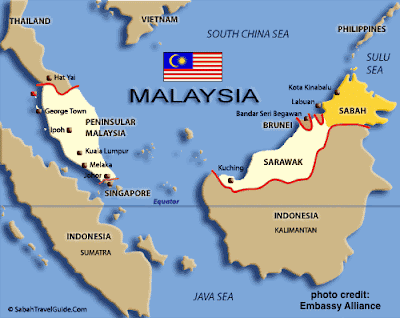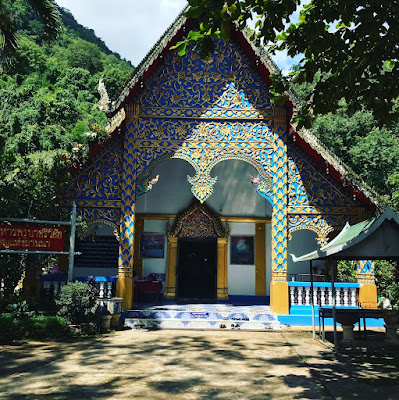This past week I had the opportunity to go on my second Week Without Walls trip. Along with two teacher friends and 27 juniors, I set off for the rainforest of Sabah, located on the Malaysian side of Borneo.
I have spent this week after returning from the trip reflecting on how rich it was in people and experience and real life learning. As I smile while looking at photographs, several big trip takeaways have surfaced.
1. The importance of indigenous knowledge systems
Our second day and night were spent at Utan Paradise. This beautifully rustic jungle camp is run by a sixty-something kind, kind man and his family. Inus is part of the head-hunter tribe, under the larger umbrella of the Murut. Men from Inus's tribe have historically proven their courage and strength to potential father-in-laws by bringing heads of the men from other tribes that they have conquered. Today, nothing remains of this practice. What does remain is a people working to preserve their language, rituals and culture. Before embarking on a waterfall hike, Inus gathered us around to watch a traditional hunting ceremony. Before going out to hunt wild boar or clouded leopard, men would put together an offering of rice and tobacco on palm leaves. This is a time for the men to ask for protection from the four elements -- wind, earth, fire, and water -- before entering the jungle.
Inus, along with the Dragonfly staff, helped the students to learn to build a fire, and about how to make a hunting trap.
And then there was the fishing expedition down by the pond ...
 |
| They caught numerous fish and crawfish with those old school fishing rods. #sisfisherpeople |
As Inus continued to detail and answer questions about his life, Joschua inquired, "How come you decided to make the jungle camp instead of going into the city?" Inus responded that he had indeed tried to live in the city for 10 years, working as a cook at a hotel, but his boss was always on his case, and he never found the peace that he felt in nature while in the city. So Inus has returned to the place he feels most connected to his culture. My fellow English teacher and friend, Faye, wondered aloud as she, our other friend and colleague Aaron, and I were talking later that evening, "What is lost for all of us when the history and knowledge of different peoples is lost to time or assimilation? What happens when stories stop being told?"
So I wonder now What stories can we inquire about today, within or outside of our own family? What memories and stories might we share with our friends and family at the next dinner or get together? Who else's story might we seek to learn more about customs and traditions other than our own?
2. Ignorance really isn't bliss
It has largely been in the last four years that I have begun to consider the larger impact many of my actions have on people that I have never met. While living in Ecuador, I began to learn more about fair-trade, especially in the vein of chocolate. A cross-continental shout-out to my friends Iain and Eva who work with We.org and worked with local cacao farmers in Ecuador to develop a new fair-trade bar to bite into soon!
On this trip, it was Inus who began to enlighten me about a product called palm oil, a controversial ingredient found in lipstick, shampoo, biodiesel fuel, detergent and dozens of things we use on a daily basis. Inus spoke of the way that the palm oil plantations were destroying so much of the land and natural habitats for animals such as the orangutans and proboscis monkeys with little benefit to the people of Borneo.When I arrived back to Shenzhen, I dug more into the topic. After becoming more aware of the damage many of these plantations are doing, I am working on making more informed choices so that I can buy products that do not use palm oil, or at least use sustainably grown palm oil.
Perhaps it was more blissful for me before I knew of the unethical actions behind things like cacao trade and palm oil plantations, but it certainly is not blissful for those getting paid so little for their work, and it will not be a blissful future if we continue to plow down natural habitats and endanger more species.
Ultimately, I am left to ask, What more can I do to align my actions with my ethics? and In what ways might I team up with others to support more ethical and sustainable practices?
3. Hospitality makes a heart feel at home
One of our juniors, Jamie, articulated a sentiment that we all seemed to share when she wrote me, "The way the families at our homestay treated us made us feel at home. They welcomed us with open arms and really wanted to get to know us during the short period of time we had with them. Seeing how grateful they are for everything they have taught us to be grateful for even the smallest things in our lives." The warmth extended by each our of homestay hosts by and large seemed to have the largest impact on our students as two others, Sean and Joschua also reflected on this part of Week Without Walls. Sean noted that "This year's WWW was absolutely amazing ... what really stuck with me is the big smiles and hospitality the locals gave us throughout our visit. I truly admire the way the Malaysian people we met live in so much more happiness and harmony compared to some of the most privileged people in the world; I definitely appreciate my life more than I did before the trip." Joschua echoed much of this when he wrote, "I tried to do as much as possible to immerse myself in the local culture and some things that will stay with me are buying the fresh seafood at the market on the first day and staying with the homestay in Papar. Our host was great and we felt as if we were part of the family. We even got to hold the baby (!!!)." (I love ... love that he used three exclamation marks to denote his excitement at holding the baby. #sisstudentsrock)
 |
| Titta and NaYoon at breakfast with their hostess. |
 |
| Alejandra, Minseo, Thea, Evelyn and I had so much delicious food this morning, I do not know how I ended up eating such a squirmy ... well, that's next up ... |
As we hugged our host family goodbye, I wondered Do guests in my house feel like family? What might I do to extend even more hospitality to those I host?
4. Living outside your comfort zone has its rewards
I ate a worm. Not a skinny earthworm, but a fat, juicy sago worm. It started with a pact, between Aaron, Faye and I. Because we are IB teachers, and we must also model the learner profile, one of the qualities of which is "risk taker."
So we sunk our teeth into that big worm above, which does turn into a rather large beetle over time. I was told it would taste something like coconut. I love coconut. Everything coconut. So I figured I could get over the texture, and the fact that it squirms in your mouth for a moment, and appreciate the coconut-ty goodness. Well, to my disdain, I tasted zero coconut flavor when I bit down into the creamy flesh of that worm. Faye's reaction on the other hand: priceless. And Aaron's, as cool as a cucumber. Meanwhile, I was flailing my hands about and scrunching my nose ...
I do not believe I will be compelled to eat another ... in my entire life, but as it stands, I did get the equivalent of egg protein from popping that wood-dwelling wiggler into my mouth. That was, can we say, the benefit. The reward was really the fact that we essentially started a sago worm eating revolution amongst the students. And those reactions were priceless, too.
This experience really begs the question Why live life in a box when you can eat sago worms out of a bucket?
I have found that my move to Asia has prompted me to ask many questions ... about the way I live, about the way others live, about and the impact we all have on one another. I have yet to come up with very clear answers to many of the questions that surface in my day to day life, and on these incredible trips. This reminds me of some words from the protagonist of the book I was reading while on the trip. In John Green's newest novel, Turtles all the Way Down, Aza reflects, "Life is a bunch of choices between wonders ... What I love about science [about life] is that as you learn, you don't really get answers. You just get better questions."
Cheers to this year's trip, to inquisitive students, to our new friends in Sabah, and to funny and interesting colleagues who are also friends. And cheers to experiences that prompt us to ask better questions.
 |
| #weekwithoutwalls2017 #juniorsinthejungle #sisrocks |
 |
| #fearlessteachers |































